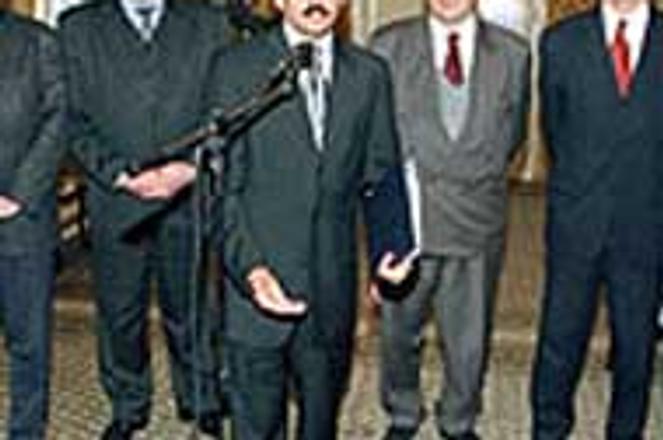The chairman of the SDK's five constituent parties told the public on December 23 they had agreed to agree.photo: TASR
An agreement reached shortly before Christmas among top officials of the Slovak Democratic Coalition, the largest government party, was hailed by its authors as stabilising relations within the party and ending months of tension within the government.
The deal, signed on December 23, gives all five member parties of the Slovak Democratic Coalition (SDK) equal representation on a 'Council of Chairmen' composed of the leaders of the five parties as well as SDK boss and Prime Minister Mikuláš Dzurinda. According to the text of the agreement, the six-member council will meet at least once every two months and will "discuss all political questions which its members feel necessary."
Political professionals were divided over whether the recent compact would really help to clarify relations between the five SDK platforms and give the SDK a functional decision-making body.
"This [agreement] is a big signal that the SDK is moving towards stability and returning to a coalition footing," said Grigorij Mesežnikov, president of the Institute for Pulic Affairs (IVO) think tank.
But Luboš Kubín, a political scientist with the Slovak Academy of Sciences, said the deal was a public relations ploy designed to improve the SDK's image as the main source of chaos within the government. "Mikuláš Dzurinda wanted to show voters before Christmas that he could produce some agreement," said Kubín.
"In actual fact, this deal is nothing new - it was reached six months ago at the SDK congress in Prešov. All it does is confirm the way the party has been functioning since Prešov."
Order wanted
The SDK has been the least stable element of the government since the latter's formation in October, 1998. The party unites five founding platforms from across the political spectrum, all of which have their own chairmen, caucuses and policy priorities. Until the recent agreement, these parties had unequal representation on the SDK's 'Coalition Council,' and lacked a clear role in decisions the mother party took.
The result of the confusion was frequent public quarrels over internal SDK matters and government policy; officials from the other three parties of the government coalition regularly called on the SDK to put its house in order.
The document declares support for the Dzurinda government, a promise to abide by the coalition agreement betweeen the government parties, and a pledge not to break up the SDK's parliamentary caucus. However, it says nothing about how the SDK will be represented in government negotiations.
Moreover, disagreement among the signatories themselves as to what the latest agreement means for the future of the SDK belied their claims that order had been brought to the party. At the December 23 press conference following the signing of the pact, Prime Minister Dzurinda refused to say whether the agreement meant the de facto return of the SDK party to a five-member coalition or its continuance as a single party. "Terms and symbols are not important to me," he said.
But Justice Minister Ján Čarnogurský, chairman of the right-wing Christian Democrat platform within the SDK, seemed to have no doubts. "The signing of the agreement is de facto rather than de jure a return to the five-member coalition," he told journalists, "in the sense that the coalition council is a council of the chairmen of the five parties, which will take the most important political decisions."
Ján Langoš, chairman of the free market Democratic Party platform, also hailed the deal as confirming the SDK's coalition nature. "If Langoš sees it that way, that's his right," answered Dzurinda, adding that further negotiations beginning on January 10 would produce a clear decision on the future direction of the SDK.
Political scientist Kubín said it was unlikely that the next round of talks would produce any substantive agreement. "This is a political problem, and all the member platforms have different visions of the future of the SDK," he said.
Kubín added that were the SDK to break up into a coalition, the party would have to find a way around the country's party financing laws. Since it was the SDK, and not its five member parties, that contested the 1998 elections, it is now only the SDK which has a right to funding from the state budget.
Furthermore, since it was the SDK and not its member platforms which signed the coalition agreement with the other three parties of government 15 months ago, the latter parties are now understandably reluctant to see the SDK replaced by five parties which did not sign the coalition pact.



